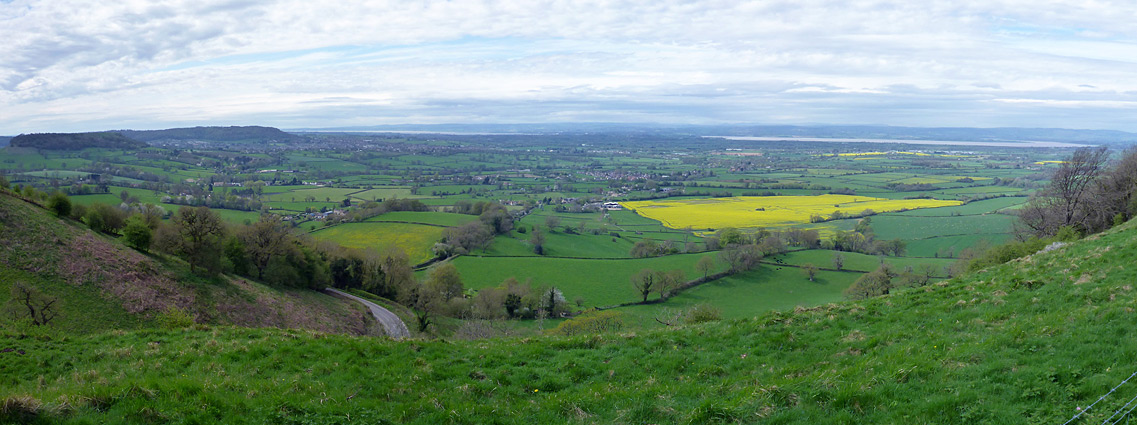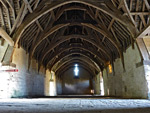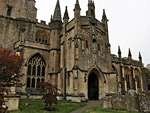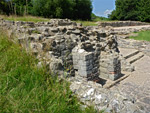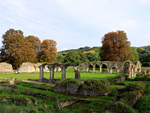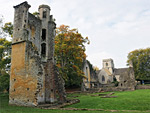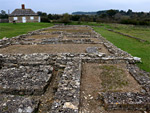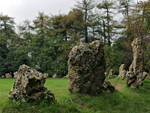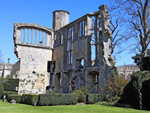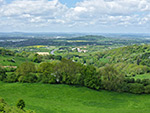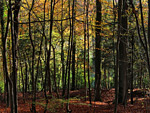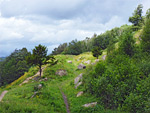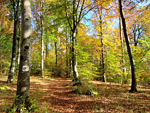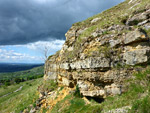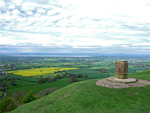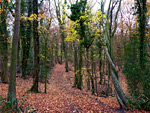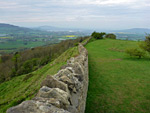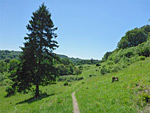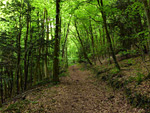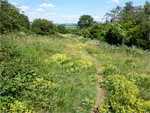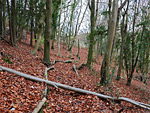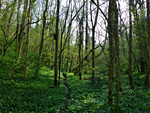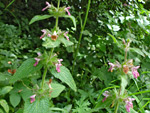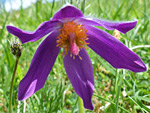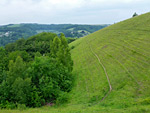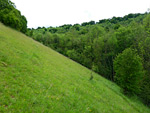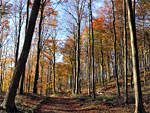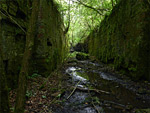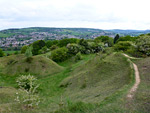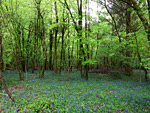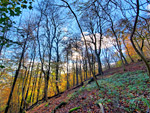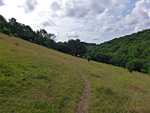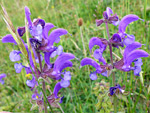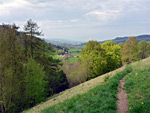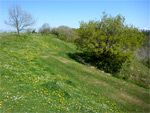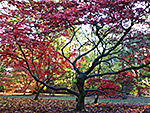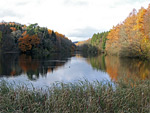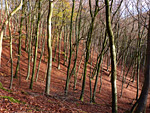The Cotswold Hills, or just the Cotswolds, are a sizeable range of low, rolling hills, underlain by oolitic limestone, stretching in a 60 mile arc from the vicinity of Bath in Somerset, northeastwards towards Banbury in Oxfordshire. The hills are protected as an Area of Outstanding Natural Beauty (established 1966), of which most, about 65%, is in Gloucestershire, with smaller areas and Wiltshire, Worcestershire and Warwickshire, a total area of 787 square miles, making this is the largest AONB in England and the third largest designated landscape behind the Lake District and the Yorkshire Dales.
The majority of the land is gently undulating, not especially distinctive and without any prominent summits; the hills take the form of a plateau sloping up gradually from southeast to northwest, and has high relief only along its western edge, as here the land drops steeply down by up to 700 feet over a great escarpment known as the Cotswold Edge. Along here are found scattered areas of open, unfenced land, though the great majority of the AONB is regular farmland, dotted with picturesque towns and villages, often containing buildings constructed of the local fossil-rich limestone, richly coloured in shades of yellow-brown. This Cotswold Stone has been quarried since Roman times.
The most spectacular landscapes in the Cotswolds are concentrated along the escarpment, including hills, commons (traditionally managed communal pasture), and ancient woodlands, especially beech, which cloak many of the steep west-facing slopes, and also the sides of the branched valleys that cut through the escarpment. The most famous of these are concentrated in the middle of the hills, between Stroud and Cheltenham, and some of the finest landscapes of each type are contained within the Cotswold Commons and Beechwoods National Nature Reserve. Some other commons, and grassy areas, are protected as local nature reserves, because of the wide range of calcareous plants that grow there; orchids are especially varied. The Cotswolds are also noted for historic sites, ranging from Neolithic monuments to grand country mansions.
As of summer 2020 the area is now known as Cotswolds National Landscape.
The majority of the land is gently undulating, not especially distinctive and without any prominent summits; the hills take the form of a plateau sloping up gradually from southeast to northwest, and has high relief only along its western edge, as here the land drops steeply down by up to 700 feet over a great escarpment known as the Cotswold Edge. Along here are found scattered areas of open, unfenced land, though the great majority of the AONB is regular farmland, dotted with picturesque towns and villages, often containing buildings constructed of the local fossil-rich limestone, richly coloured in shades of yellow-brown. This Cotswold Stone has been quarried since Roman times.
The most spectacular landscapes in the Cotswolds are concentrated along the escarpment, including hills, commons (traditionally managed communal pasture), and ancient woodlands, especially beech, which cloak many of the steep west-facing slopes, and also the sides of the branched valleys that cut through the escarpment. The most famous of these are concentrated in the middle of the hills, between Stroud and Cheltenham, and some of the finest landscapes of each type are contained within the Cotswold Commons and Beechwoods National Nature Reserve. Some other commons, and grassy areas, are protected as local nature reserves, because of the wide range of calcareous plants that grow there; orchids are especially varied. The Cotswolds are also noted for historic sites, ranging from Neolithic monuments to grand country mansions.
As of summer 2020 the area is now known as Cotswolds National Landscape.
Historic SitesBradford-on-Avon Tithe Barn Perfectly preserved 14th century barn with buttressed stone walls and an intricately constructed timber roof Rating: ★★★★★ |
| Church of St Peter and St Paul, Northleach Cathedral-like parish church, mostly dating from the 14th century, noted for its collection of early brasses Rating: ★★★★★ |
| Great Witcombe Roman Villa Excavated foundations of a substantial Roman villa, inhabited up to the 5th century, and rediscovered in 1818 Rating: ★★★★★ |
| Hailes Abbey Limited but atmospheric and picturesque ruins of a Cistercian monastery; arches of the cloisters, and foundations of other buildings Rating: ★★★★★ |
| Minster Lovell Hall Photogenic ruins of a grand 15th century mansion, with a peaceful setting beside the River Windrush, lined by ancient trees Rating: ★★★★★ |
| North Leigh Roman Villa Foundations of a Roman villa, inhabited from the 2nd to 5th centuries, in a rural setting close to the ancient travel route of Akeman Street Rating: ★★★★★ |
| Rollright Stones Three ancient stone monuments near the east edge of the Cotswolds; a circle, a burial chamber and a standing stone Rating: ★★★★★ |
| Sudeley Castle Privately-owned fortified mansion built in the 1440s, with extensive gardens and some ruined components; open to visitors Rating: ★★★★★ |
LandscapesBarrow Wake Nature Reserve Steep-sided limestone hill along the edge of the Cotswolds, with fine westwards views and over 100 plant species Rating: ★★★★★ |
| Box Wood Nature Reserve Ancient woodland, including beech trees, along both sides of a narrow valley centred on a small, spring-fed stream, the upper end of which forms waterfalls and cascades Rating: ★★★★★ |
| Browne's Folly Ancient ash woodland on steeply sloping ground above the River Avon, plus several old quarries, now colonised by calcareous grassland Rating: ★★★★★ |
| Buckholt Wood Ancient woodland, mainly beech, across south-facing slopes; dry above, springs and streams below Rating: ★★★★★ |
| Cleeve Common Large expanse of floral, calcareous grassland, including the highest point in the Cotswolds Rating: ★★★★★ |
| Coaley Peak Nature Reserve High point along the west edge of the Cotswolds, with views to the Severn valley. Also site of a prehistoric burial chamber Rating: ★★★★★ |
| Coopers Hill Nature Reserve Sizeable area of ancient beech woodland at the edge of the Cotswolds, overlooking the Severn Vale Rating: ★★★★★ |
| Crickley Hill Nature Reserve Prominent limestone hill at the edge of the Cotswolds, overlooking Gloucester and the Severn valley; a noted wildflower location, plus old quarries and the remains of an Iron Age hillfort Rating: ★★★★★ |
| Daneway Banks Nature Reserve Sloping calcareous grassland plus scrub and patches of trees, supporting a wide variety of plant species; in a quiet part of the Cotswolds Rating: ★★★★★ |
| Frith Wood Nature Reserve Ancient beech woodland on two sides of a ridge in the Cotswold Hills near Stroud Rating: ★★★★★ |
| Kilkenny Nature Reserve Sloping enclosure of unimproved calcareous grassland in the Cotswolds, containing many wildflower species Rating: ★★★★★ |
| Laurie Lee Wood Small patch of ancient woodland across a steep, north-facing slope above the valley of Slad Brook Rating: ★★★★★ |
| Midger Wood Nature Reserve Belt of ancient woodland in a narrow valley containing a tufa-lined stream, flowing over small waterfalls Rating: ★★★★★ |
| Old London Road Nature Reserve Small, narrow field at the edge of the Cotswolds, one of only two UK locations for limestone woundwort, a very rare plant Rating: ★★★★★ |
| Painswick Beacon Grassy part of the western escarpment of the Cotswolds, also site of an Iron Age hillfort. Good views and varied wildflowers Rating: ★★★★★ |
| Pasqueflower SSSI Rare wildflowers in a peaceful, grassy valley in the Cotswold Hills; also contains orchids in addition to the pasqueflower, which blooms in April and May Rating: ★★★★★ |
| Rodborough Common Large expanse of calcareous grassland, southeast of Stroud Rating: ★★★★★ |
| Rough Bank Sloping grassland above a narrow valley in the Cotswolds, home to many species of butterflies and plants Rating: ★★★★★ |
| Saltridge Wood Mature beech woodland on the slopes above Painswick Valley, part of Cotswold Commons and Beechwoods National Nature Reserve Rating: ★★★★★ |
| Sapperton Valley Nature Reserve Woodland and wet meadows along the River Frome, incorporating a disused section of the Severn and Thames Canal Rating: ★★★★★ |
| Selsley Common Limestone grassland, flat or steeply sloping, along the west edge of the Cotswold escarpment, south of Stroud Rating: ★★★★★ |
| Siccaridge Wood Nature Reserve Ancient coppiced woodland, on sloping ground above the disused Severn-Thames Canal; several rare wildflower species Rating: ★★★★★ |
| Stinchcombe Hill Promontory at the west edge of the Cotswolds; calcareous grassland on top, and oak/ash/beech woods around the perimeter Rating: ★★★★★ |
| Strawberry Banks SSSI Two grassy fields above a small valley, sloping down to a stream, a tributary of the River Frome Rating: ★★★★★ |
| Stuart Fawkes Gently sloping pasture on calcareous soils, with a selection of common wildflowers and one very rare species, meadow clary Rating: ★★★★★ |
| Swift's Hill Nature Reserve Hillside nature reserve; a noted location for wildflowers, including 15 species of orchid Rating: ★★★★★ |
| Uley Bury Detached part of the Cotswold escarpment; a flat-topped limestone hill, site of a large Iron Age fort Rating: ★★★★★ |
| Westonbirt Arboretum Collection of 2,500 species of trees and shrubs from around the world, mixed with a sizeable area of ancient, natural woodland Rating: ★★★★★ |
| Woodchester Park Hidden valley in the Cotswolds, containing an unfinished mansion, a chain of lakes, grassy slopes and extensive woodland Rating: ★★★★★ |
| Workmans Wood Mature beech woodland on steep-slopes in the upper Painswick Valley, part of Cotswold Commons and Beechwoods National Nature Reserve Rating: ★★★★★ |
